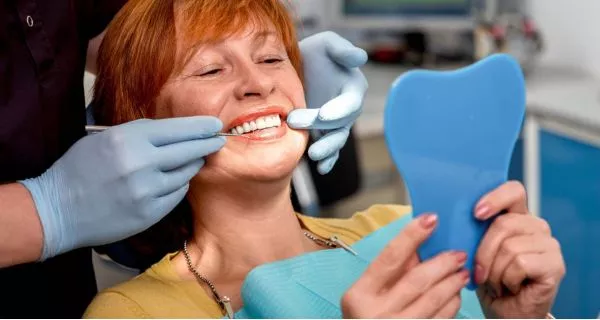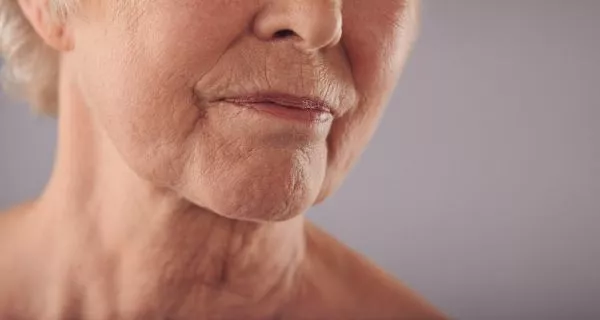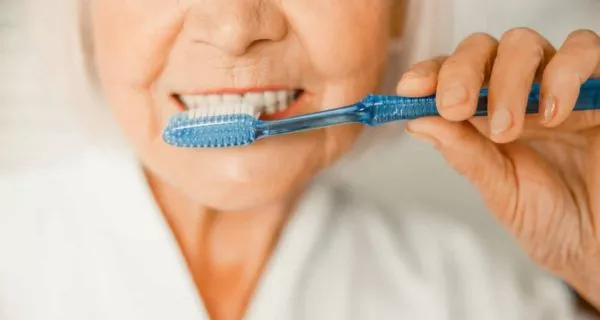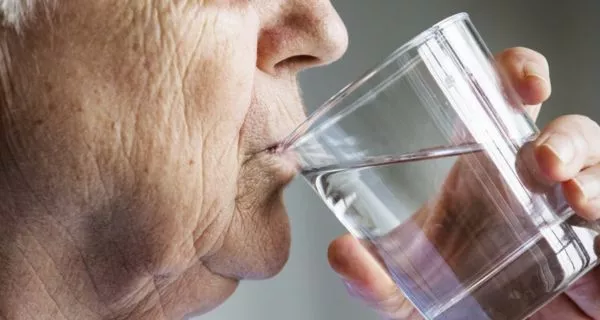Last Updated on: 20th December 2025, 07:31 am
To prevent tooth decay and tooth loss in seniors, they must maintain good oral hygiene with fluoride toothpaste, floss daily, stay hydrated, and visit a dentist regularly. A balanced diet rich in calcium and limited sugar intake also helps protect enamel and gums, ensuring strong, healthy teeth as they age.
Many people assume that losing teeth is a natural part of aging, but it doesn’t have to be. Tooth decay and tooth loss in seniors can be prevented with proper oral hygiene and care throughout life.
In recognition of Geriatric Tooth Fairy Day, we celebrate the idea that it’s never too late to protect your natural smile. Modern dentistry takes a much more conservative and preventive approach, focusing on keeping one’s natural teeth healthy for as long as possible.
In this article, you’ll learn how to prevent tooth decay and the practical steps to keep your teeth and gums in excellent condition, no matter your age.
What is the link between tooth decay and tooth loss?
Tooth decay develops slowly, but if untreated, it can lead to tooth loss. Here’s how it happens step by step:
- Bacteria feed on sugars left on the teeth.
- They produce acids that weaken and dissolve the enamel.
- A cavity forms and reaches deeper layers of the tooth.
- Infection spreads to the pulp and gums.
- Bone and tissue weaken, and the tooth eventually loosens or falls out.
Understanding how to prevent tooth decay is important; stopping this process early keeps your teeth and gums healthy for life.
Why does tooth decay and tooth loss increase with age?
Tooth decay is one of the most common oral problems worldwide; it affects nearly 100% of older adults at some point. With age, the mouth changes in ways that make teeth more prone to cavities, gum disease, and eventually, tooth loss.
What changes in the mouth with age?
As we age, our teeth and gums experience natural wear and biological changes that raise the risk of cavities. Here’s what happens:
- Gum recession: Roots become exposed and unprotected by enamel, making them easy targets for bacteria.
- Worn or loose dental work: Old fillings, crowns, or bridges can crack or loosen, creating spaces where bacteria hide.
- Reduced saliva flow: Saliva helps neutralize acids and wash away bacteria; when it’s low, decay develops faster.
These small changes, over time, create ideal conditions for decay to start and spread.
How do health conditions and medications affect teeth?
Many systemic conditions and medications common in older adults have a direct impact on oral health.
- Dry mouth (xerostomia): a side effect of more than 500 medications, including those for hypertension, anxiety, depression, and diabetes. Without enough saliva, acids and bacteria damage teeth faster.
- Diabetes: High blood sugar levels favor bacterial growth and slow healing, making infections and cavities more difficult to control.
- Osteoporosis: weakens the jawbone, reducing tooth support and making bone loss more likely.
- Heart disease and medications: Some heart drugs cause gum overgrowth or dryness, increasing infection risk.
These conditions not only increase the risk of decay but also make recovery from dental infections more difficult.
How do diet and daily habits influence tooth decay?
Every day choices play a huge role in how to prevent tooth decay, especially later in life.
- Soft or sugary foods: Common in senior diets, they feed decay-causing bacteria.
- Frequent snacking: Constant exposure to sugars keeps acids active in the mouth.
- Inconsistent hygiene: Skipping brushing or flossing allows plaque to harden into tartar.
- Poorly cleaned dentures: trap bacteria and irritate gums if not disinfected daily.
- Low nutrient intake: Not enough calcium, vitamin D, or phosphorus weakens enamel and bone.
- Tobacco use: reduces gum blood flow, delays healing, and raises infection risk.
The rise in tooth decay and tooth loss among seniors isn’t just about “getting old”; it’s the result of many combined factors, including medical conditions, lifestyle choices, and natural oral changes.
How to prevent tooth decay and tooth loss as you age?
Keeping your mouth clean every day is the best way to avoid cavities and tooth loss. You can follow some small daily steps to protect your teeth and gums. Let’s see what they are.
How should you brush your teeth?
Brushing is your first line of defense against decay and gum problems.
- Brush at least twice a day, especially before bedtime.
- Use fluoride toothpaste, which strengthens enamel and repairs early damage.
- A soft-bristle or electric toothbrush cleans deeply without hurting gums.
- Replace your toothbrush every three months for best results.
Helpful tools and products
You should look for tools that help you clean more easily and better, such as:
- An electric toothbrush with a pressure sensor can prevent over-brushing and clean better for people with limited hand movement.
- Fluoride toothpaste keeps enamel strong and reduces sensitivity.
Why is cleaning between teeth so important?
- Plaque hides where a toothbrush can’t reach.
- Cleaning between teeth every day helps prevent both cavities and gum disease.
Helpful tools and products
If flossing feels difficult, try easier tools like:
- Water flossers are perfect for seniors or people with arthritis; they clean comfortably and reduce gum bleeding.
- Interdental brushes are reusable and fit between larger gaps where floss may not work.
How can you manage dry mouth?
Dry mouth (called xerostomia) is very common in older adults, especially if they take medications for blood pressure, diabetes, or anxiety. When the mouth is dry, bacteria and acids grow faster, leading to tooth decay.
Here’s what helps:
- Drink water often, especially between meals.
- Avoid alcohol-based mouthwashes and sugary drinks that dry the mouth.
- Chew sugar-free gum or suck on xylitol lozenges to stimulate saliva.
Helpful tools and products
- Moisturizing gels or sprays keep the mouth hydrated for hours.
- Saliva substitutes or fluoride rinses protect enamel and help neutralize acids.
How can you protect exposed roots?
When gums recede, the tooth roots become more exposed. Since they have no enamel, they decay faster.
You can protect them:
- Ask your dentist to apply fluoride varnish or a protective sealants on the vulnerable areas.
- Avoid hard brushing and acidic foods.
Helpful tools and products
- Use desensitizing toothpaste for exposed roots to help block pain and strengthen soft dentin areas.
Should you review your medications?
Yes! Some medicines cause dry mouth or change your saliva’s pH, increasing the risk of cavities.
What you can do:
- Ask your doctor if any of your medications affect oral health.
- Never stop medication on your own, but discuss possible adjustments.
- Keep your mouth hydrated daily.
Helpful tools and products:
- Fluoride mouth rinses protect enamel weakened by medication effects.
- Moisturizing mouth sprays relieve dryness caused by daily treatments.
How can diet help protect your teeth?
What you eat every day has a big effect on your teeth and gums.
- Eat calcium-rich foods like milk, cheese, and yogurt to keep enamel strong.
- Add vitamin D and phosphorus from fish, eggs, and whole grains.
- Avoid sticky, sugary snacks and acidic drinks.
- Drink plenty of water; it washes away food and helps prevent decay.
- Avoid smoking and alcohol, which dry the mouth and damage the gums.
Helpful tools and products
- Fluoride toothpaste supports enamel strength with your daily diet.
- Mouth rinses with xylitol can reduce bacterial growth after meals.
Getting older doesn’t mean losing your teeth. With small daily habits, brushing well, cleaning between teeth, staying hydrated, and eating healthy, you can protect your smile for many more years.
How often should you visit the dentist?
Even with perfect hygiene, professional dental care is essential. Your dentist can spot small problems before they cause pain or tooth loss. Your job:
- Visit your dentist every six months, or more if advised.
- Get professional cleanings to remove tartar and bacteria.
- Replace old or broken fillings early to avoid infections.
What if you can’t visit a dental office?
If you have health or mobility problems that make it hard to visit the dentist, home dental care can be a good option.
Some trained professionals will come to your home and perform most basic dental treatments.
The important thing is not to wait. Untreated infections or cavities can lead to tooth loss and affect your overall health.
How can you take care of your teeth while traveling?
If you’re traveling or living abroad, it’s important to keep your oral health in check. Dental tourism lets you combine dental care and travel, often with good quality at lower prices.
Before your trip:
- Schedule a checkup to prevent emergencies while away.
- Find certified clinics at your destination just in case.
- Use your trip to get cleanings or treatments you’ve postponed.
Platforms like FindDentist help you locate trusted clinics, compare prices, and book ahead, so you can smile with confidence wherever you go.
Can you imagine reaching old age with all your teeth?
Getting older doesn’t mean losing your smile. With daily care, a balanced diet, the right hygiene products, and regular dental visits, you can prevent tooth decay and reduce the risk of tooth loss.
Every tooth you keep is a victory for your health, confidence, and happiness. Protecting your natural smile is one of the best investments you can make in your well-being.
Frequently Asked Questions
Can I still get cavities if I brush every day?
Are dentures enough to replace natural teeth?
Can medications affect my teeth or gums?
What if I wear partial dentures or bridges?
How often should older adults visit the dentist?
Voice and Search (Q&A)
How can seniors improve oral hygiene?
Use an electric toothbrush, water flosser, and fluoride toothpaste to clean and protect enamel, even if hand movement is limited.
What’s the link between aging and tooth decay?
As we age, gums recede and roots become exposed, making teeth more sensitive and prone to decay. Daily care and fluoride help protect them.
Are electric toothbrushes better for seniors?
Yes, electric toothbrushes clean more effectively and are easier to use for people with arthritis or limited mobility.
Share
References
1. Cleveland Clinic. (2025, August 27). Tooth loss. https://my.clevelandclinic.org/health/diseases/tooth-loss
2. Higuera, V. (2023, May 18). Tooth cavities. Healthline. https://www.healthline.com/find-care/articles/dentists/tooth-cavities
3. Natto, Z. S., Aladmawy, M., Alasqah, M., & Papas, A. (2014). Factors contributing to tooth loss among the elderly: A cross-sectional study. Singapore Dental Journal, 35, 17–22. https://doi.org/10.1016/j.sdj.2014.11.002
4. NIH. (2022). Dental Caries (Tooth Decay) in Seniors (Aged 65 and older). https://www.nidcr.nih.gov/research/data-statistics/dental-caries/seniors
5. Tee, M. R. A. (2021, November 5). What to know about dental problems and oral health. https://www.medicalnewstoday.com/articles/dental-problems
-
Dr. Yeidy Carolina Mesa [Author]
DDS Yeidy Carolina Mesa Passionate Dentist | Advocate for Accessible Oral Health Education Graduating from Universidad CES in 2022, I am a dedicated general dentist with a lifelong passion for helping others and making a meaningful impact in the world. My journey into dentistry began at the age of 7, inspired by my own experience with braces and overcoming a fear of the dentist. This personal journey shaped my mission to help patients conquer their own dental anxieties and embrace a healthier,...
View all posts
-
Nayibe Cubillos M. [Medical Reviewer]
Pharmaceutical Chemestry |Pharmaceutical Process Management | Pharmaceutical Care | Pharmaceutical Services Audit | Pharmaceutical Services Process Consulting | Content Project Manager | SEO Knowledge | Content Writer | Leadership | Scrum Master
View all posts
A healthcare writer with a solid background in pharmaceutical chemistry and a thorough understanding of Colombian regulatory processes and comprehensive sector management, she has significant experience coordinating and leading multidisciplina...






















